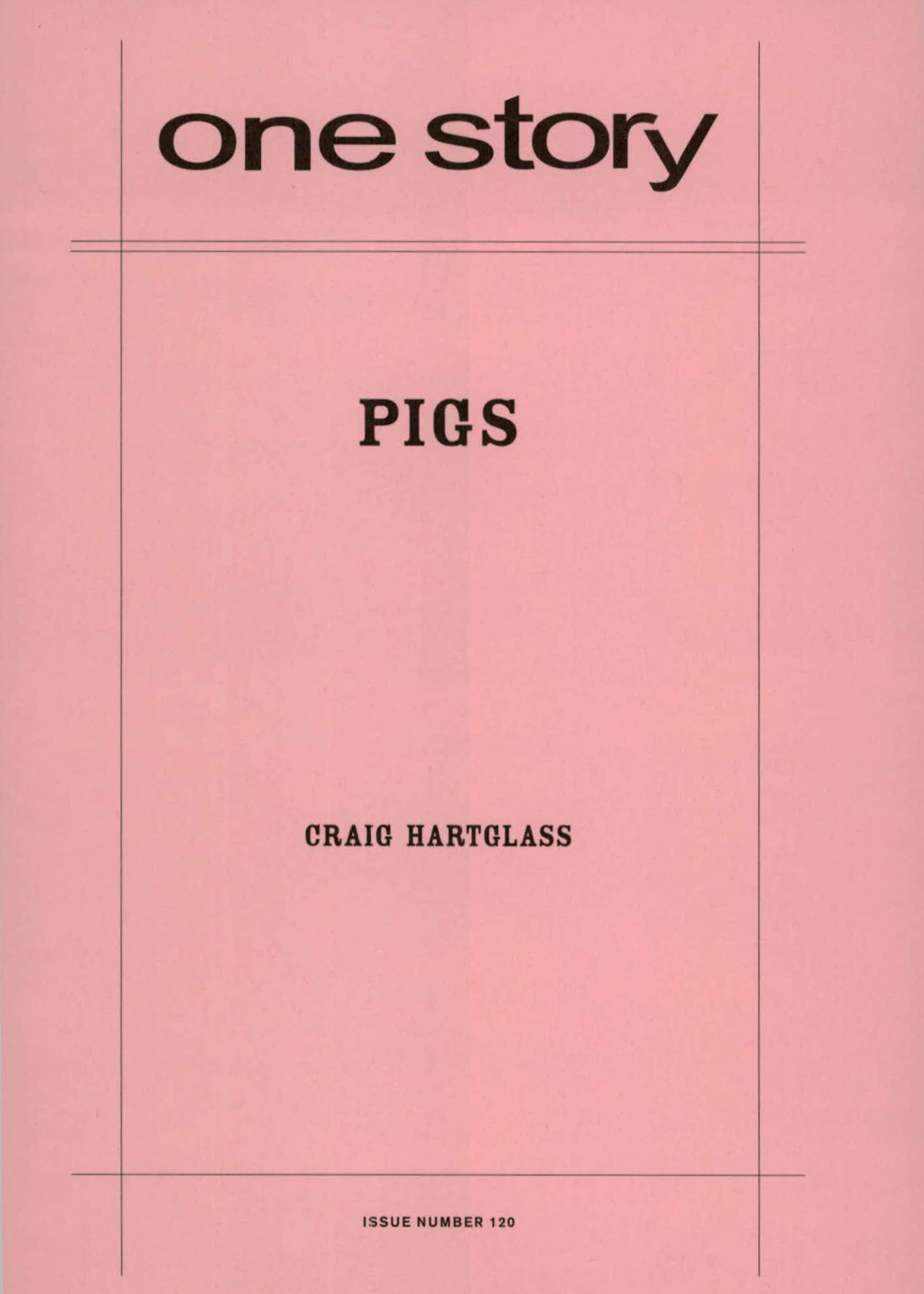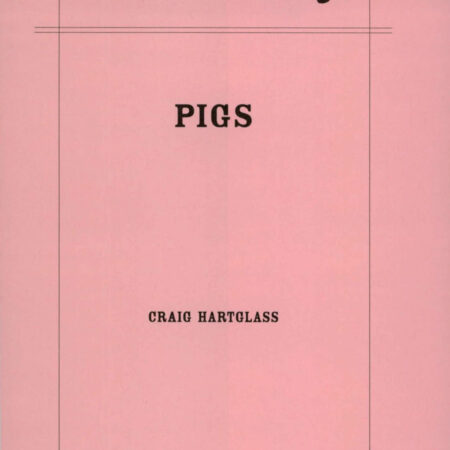
Pigs
$2.50
74 in stock
Excerpt
She had been thin then.
He remembered the very beginning, when she started at the bank, how her black hair filled the booth with a fiery charm that managed to cut through the meanness of her personality, her flagrant disregard and dismissal of him, and his own wondering: was it his lack of height or the gap between his teeth or the bump in his nose or his messy work clothes and boots or something altogether different? She had that special kind of youth that certain Latin girls possess with big hoop earrings and lips with a fine dark line mapping their perimeter. She would laugh then, too. Though not with him. Never with him. Always with the others. She would laugh with the girls in the other slots, behind the great black counter, behind the inch-thick glass impervious to gunfire, where they sat counting the money. Ha ha ha ha ha, she would say. It was a laugh that made him think of girls in school who knew things before the others, girls who developed breasts at a very young age, though she, with the dark hair and outlined lips, laughing behind the counter, had not been one of those girls. No. He was sure of that.
Craig Hartglass
Craig Hartglass has worked as a tin-knocker, roofer, and carpenter. His fiction has appeared or is forthcoming in: Quarterly West, The Distillery, Passager, Hardboiled, The Chaffin Journal, The South Carolina Review, and others. He lives in Connecticut along with a few plants, the ashes of his cat, and a brain filled with spirochetes.
Q&A by Hannah Tinti
- HT: Where did the idea for this story come from?
- CH: I would go into the bank or the grocery and see the same faces, sometimes for years, sometimes decades, and notice the changes over time. I’m sure they noticed the same in me. I got thinking about this. On a superficial level I knew these people, but I really had no idea who they were. I wanted to find a way to show this: the relationship between two characters who know each other yet don’t, the changes in their lives over a stretch of time, and the way these changes affect the way they see each other. Also, I knew I wanted one of the characters to be a collector. I’m not a collector, so I’m fascinated by people who collect stuff. Why do they do that?
- HT: What was the most challenging aspect of writing this story?
- CH: Two things were hard, structure and ending. I had no idea how to structure a story where the main characters didn’t interact. I tried a few times, a few different ways—but could never get it to work. The characters were clear in my mind, but it took forever to figure out how to tell their story—once I did, of course, it seemed simple. And then the ending was really hard. Since the characters knew each other so intimately on the surface, it was difficult to find a way to get them to connect that wasn’t like a made-for-TV movie (which my original ending probably was). For this, I have to thank Elliott, who helped me see the story and the characters in a different light, and was very generous and insightful with her suggestions.
- HT: Neither of the main characters in this story is ever named. The protagonist is referred to as “the customer,” thus emphasizing the transactional nature of his relationship with the “pig girl” in the bank. Was this a conscious choice in the first draft?
- CH: I can’t say it was a conscious choice, but it is something I do quite a bit. It seems to happen when I write in certain voices. A lot of times I’ll be pretty deep into a story before I realize that many of the characters don’t have names, and are simply referred to by some bit of description, physical or occupational or relational or other. Maybe it’s just the way my mind works. But I think people do that, find ways to categorize each other, especially people they don’t know. Or maybe it’s that we never really know each other beyond a certain point.
- HT: The story takes place over many years, but we never see these characters interact outside of the bank. What was it about the bank (as opposed to say, the post office) that inspired you to set this story there?
- CH: I’m not sure. I would guess it has something to do with the fact that, because of the financial information the teller sees on the screen, he or she knows more about the customer than other service providers, more than the postal clerk or the grocer, say. Over time, the teller sees ups and downs in the customer’s finances, while observing changes in physical appearance, attitude, dress, health, emotions, etc. And conversely, since the tellers inhabit those cubes, and since they tend to exhibit their lives with photos and stuffed toys and knickknacks and trinkets, the customer gets a glimpse into their personalities. So over a period of years, simply by observation, the customer and teller develop some understanding of who each other are...or at least they think they do.
- HT: The precision of the observations is extraordinary in this story. We see these characters in only one setting, but you selected such specific details about them that we feel like we know them well. Do your stories generally start with character? With voice? With setting? How do you usually begin?
- CH: Thanks for the nice words about the observations. I wish I could say I knew where the stories started. It can be any of those, character, voice, setting, or sometimes a situation. But the ones that seem to work best are the ones where the voice comes in and takes over. With this story I had the characters in my head a long time, but one day the voice just came and the story flowed out.
- HT: Have you ever seen a woman with pigs painted on her fingernails?
- CH: I don’t think so. Maybe. You know, I don’t remember it but I must have. Who could make something like that up?
- HT: You didn’t get an MFA. Can you talk a bit about how you started writing and about the writing community you’ve found outside the world of MFA graduates? There are so many paths to a writing career.
- CH: I read a ton as a kid. I started writing lousy stories in the early nineties, and slightly-less-lousy stories by the middle of this decade. I think MFA grads have a huge advantage in that, in a short time, they get to write like crazy and learn what makes a story work and why, while surrounded by a community of like-minded people. On the other hand, I think there’s an advantage to working interesting and difficult jobs and gathering material through life experience—wretched as it may seem at the time. It just takes longer to learn how to get it onto the page. As far as a writing community, mostly it’s pretty lonely. I’m lucky to have a few writer friends, one in particular, with whom I swap and critique work. A while back, I was a member of a writing group and that was very helpful. I learned much, met wonderful people, and made longtime friends. I miss it.
- HT: How long did it take you to complete this story?
- CH: It simmered about four years. Then, when the voice finally hit, the first draft burst out in four or five hours. After that, I played around with what I had for a month or so, then let it sit a while before looking again and playing some more. And finally, there was another few months of rewrites, with much help from Elliott and Hannah and the editors of One Story, to get it into its present form.
- HT: What are you working on now?
- CH: When I can, I’m working on a series of interconnected stories that form a novel; also a bunch of random stories that don’t form anything at all.
- HT: What is the best bit of advice about writing you have ever received?
- CH: One thing I find really helpful when I’m stuck and nothing will come, is to play a piece of music that evokes the same feeling as the scene or section I’m stuck on. I’ll play a song over and over, almost insanely so, until I am drowning in that feeling—and often that will be the secret passageway back into the story.
